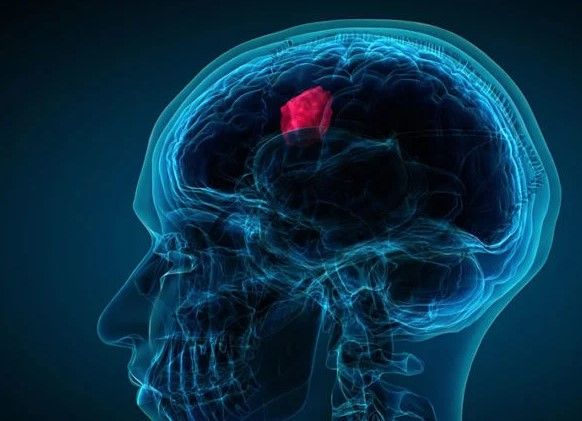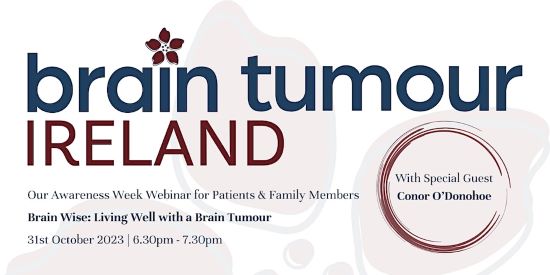
True or False: Top 5 things to know about brain tumours
Wild Youth band member, Conor O’Donohoe, is the special guest at a forthcoming public webinar “Brain Wise: Living Well with a Brain Tumour” being organised by Brain Tumour Ireland, the national charity supporting people with a brain tumour and their families, to coincide with International Brain Tumour Awareness Week (October 28 to November 4).
Conor sadly lost his mum, Jackie, to a brain tumour in 2011. Then just 17 years’ old, Conor will speak about how he navigated that time, how that event spurred him to live his very best life, and how his mum continues to inspire him.

The webinar, which takes place on Tuesday October 31 at 6.30pm, will also see presentations from a dietitian on eating well following treatment for a brain tumour, and jointly from a senior social worker and occupational therapist on navigating relationships at a time of great emotional trauma.
Registration for the webinar, which is free, is now open at www.braintumourireland.com.
Latest Research
In addition, on Wednesday November 1 at 6.30pm, Brain Tumour Ireland will co-host a Brain Tumour Research Update event in collaboration with the Precision Cancer Medicine Group at the Royal College of Surgeons in Ireland (RCSI). RCSI researchers, led by Prof. Annette Byrne, will discuss ongoing work to identify treatments for glioblastoma, including new ways to deliver drugs targeted directly at tumours. The event will be held in person at the RCSI, 123 St Stephen’s Green, Dublin 2.
A new online support group for parents is also being launched as part of the week, to complement the existing online patient and family support groups. Full information on all the events taking place as part of International Brain Tumour Awareness Week can be found at www.braintumourireland.com
Staying Positive
For Wild Youth band member, and Brain Tumour Ireland ambassador, Conor O’Donohoe, it is important that we offer every support to those diagnosed with a brain tumour and to stay positive for them:
“My mum was my whole world and that world got turned upside down when she was diagnosed with a brain tumour. The person who had always been my navigator suddenly needed my help to navigate life which was a very strange role reversal. I was lucky to be able to create some really special memories with her. I remember when mum would be going to chemo, we would go together, we would get lunch beforehand and then go home together and watch a movie. My advice to others who may be supporting a family member who has been diagnosed with a brain tumour is to simply be there for them, to give them your love and support, and to stay positive. Have patience if they need to walk more slowly or are forgetful and do whatever you can to lift their spirits. Be grateful for every second that you have and appreciate every moment.

“Mum always told me to be my own person and to express myself. I owe my love of music to her, for sending me to piano lessons, and for always being so incredibly supportive. Her spirit lives on for sure and she is with me all the time.”
For Mr Stephen MacNally, a neurosurgeon at Beaumont Hospital in Dublin, while symptoms of a brain tumour can also apply to so many other health issues, it is always best to get checked out:
“According to the latest figures from the National Cancer Registry (2018-2020)1, there are approximately 823 people diagnosed with a brain or other central nervous system (CNS) tumour each year in Ireland, with glioblastoma being the most common malignant tumour involved.
The good news is that the outcomes today, compared with 20 years ago, are much better thanks to the way we manage brain tumours. In terms of early diagnosis, the majority of brain tumours present with a seizure or deficit, including visual deficits, or perhaps some subtle character changes. However, I would always encourage people to get checked out by their GP for other symptoms such as recurrent early morning headache on awakening, with nausea or vomiting. With so many possible symptoms and signs, the cause is most likely to be something other than a brain tumour, but always best to get seen to.”
The National Cancer Registry also notes that brain and CNS tumours have a younger age profile than for most cancer types, representing more than 25% of all childhood cancers in Ireland. Each year, approximately 65 children and teenagers are diagnosed with a brain or CNS tumour here. Symptoms of a brain tumour can include headache, visual problems, speech difficulties, seizures, personality changes, memory loss, nausea and vomiting.
True or False: Top 5 Things to Know About Brain Tumours
Brain tumours are all the same. False.
It is estimated that there over 150 types of brain tumour, with a glioblastoma brain tumour being the most common. According to the Mayo Clinic, depending on the part of the brain in which the tumour occurs, different symptoms can arise. The frontal lobes control thinking and movement and tumours here can cause personality changes, balance problems or trouble walking. The parietal lobe in the upper middle part of the brain processes information about the senses and tumours there can cause vision and hearing problems. The occipital lobe in the back of the brain controls vision and a tumour here can cause sight loss. The temporal lobes on the sides of the brain process speech, memory and senses, and tumours there can cause speech difficulties, memory problems and altered senses.2
Not all brain tumours are cancerous. True.
Brain tumours can be malignant or benign. A malignant tumour spreads within the brain having started here in the first instance (primary brain tumour) or having spread from another part of the body (secondary brain tumour). Benign tumours do not contain rapidly dividing cancer cells and can grow for many years and may reach a large size before being detected. Malignant tumours usually grow more rapidly and come to attention earlier.
Benign tumours don’t require treatment. False.
Even benign tumours can be as serious as those that are malignant, as they can press on the brain causing serious symptoms and be a threat to life. They may still require treatments, including surgery, chemotherapy and radiotherapy.
All people with a brain tumour have a family history of the disease. False.
According to the American Brain Tumor Association, just 5-10 per cent of people with a brain tumour will have a family history of the disease3. Other associations can include rare genetic syndromes, such as neurofibromatosis and Von Hippel-Lindau disease.
Headaches are the most common symptom of a brain tumour. True.
The Mayo Clinic notes recurrent headaches happen in about half of people with brain tumours2. The classic headaches associated with brain tumours are often worse on waking in the morning and, for some, headaches wake them from sleep. The vast majority of headaches experienced by people are unrelated to having a brain tumour.
For more information on brain tumours, contact Brain Tumour Ireland on 085 7219000 (Monday to Thursday, 9am to 5pm). Alternatively, a Guide for Patients and Families on Brain Tumours newly-developed by Beaumont Hospital in partnership with Brain Tumour Ireland is available by emailing info@braintumourireland.com.





